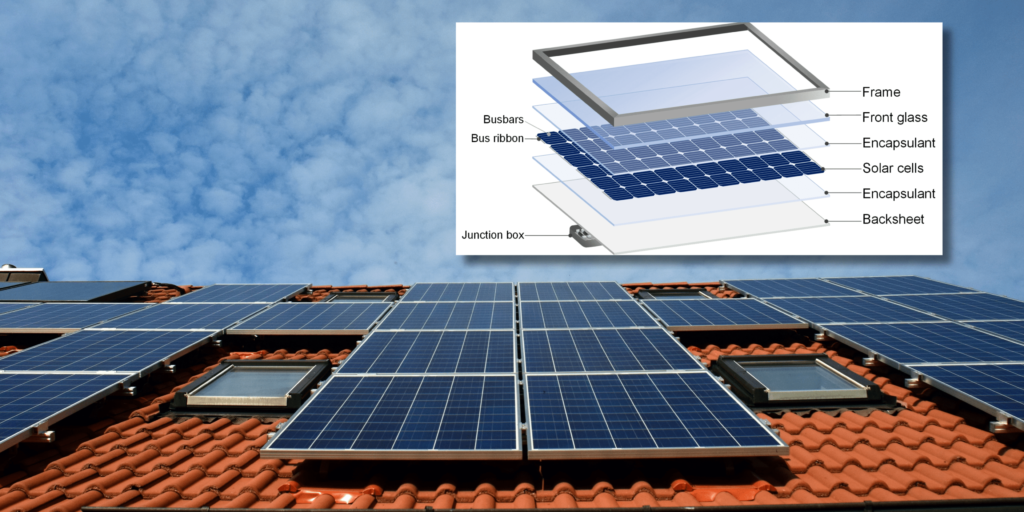
Our energy consumption is evolving. Although solar energy is frequently heralded as the energy answer of the future, it’s still a fantastic choice today. These solar-cell-based panels use a straightforward and ingenious mechanism to transform sunlight into power. However, what makes solar energy so appealing to humans, and how precisely do solar panels operate?
What Are The Components of Solar Panel?
To understand how solar panels work, let’s first examine their essential parts.
- Photovoltaic cells: These are the building blocks of any solar panel, usually made from silicon. They use the photovoltaic effect to convert sunlight into electricity.
- Inverter: This crucial component changes the direct current (DC) electricity produced by the cells into alternating current (AC) electricity, which is the type of electricity used in our homes.
- Mounting structure: This frame supports the panels and ensures they get maximum exposure to sunlight.
How Do Solar Panel Works?
In 1839, Alexandre-Edmond Becquerel discovered the photovoltaic effect, the core principle behind solar panels. When sunlight hits the surface of photovoltaic cells, it energizes the electrons in the silicon atoms, creating an electric field. This electric field allows the electrons to flow, generating an electric current. The electricity then travels to the inverter, where it’s transformed into AC electricity ready for use in homes or businesses.
What Are The Types of Solar Panel?
There are different kinds of solar panels, and each has special benefits and efficiency.
- Monocrystalline: These are a popular choice for homes because of their sleek design and excellent performance.
- Polycrystalline: More affordable than monocrystalline panels, they’re often used in commercial settings and still deliver great performance.
- Thin-film: Because they’re flexible and lightweight, thin-film solar panels can be integrated into building materials and used in unique ways.
How to Install Solar Panels?
Installing solar panels involves several steps to ensure optimal performance and efficiency. It starts with a site assessment to determine if your location is suitable in terms of sunlight exposure and roof strength. Once approved, the panels are mounted on your rooftop or a ground-mounted structure, carefully positioned for maximum sunlight absorption. Finally, the panels are connected to the electrical grid through the inverter, allowing them to seamlessly integrate with your existing power system.
What Are The Factors Affecting The Efficiency of Solar Panel?
Several factors influence the efficiency of solar panels, including the followings:
- Sunlight intensity and duration.
- Angle and orientation of the panels.
- Shading from surrounding objects or structures.
- Panels in areas with ample sunlight and optimal angle generate more electricity.
- Shaded or less sunny locations result in lower electricity generation.
Applications of Solar Panels
- Residential: Homeowners can generate their own electricity and even sell excess power back to the grid through net metering programs.
- Commercial and Industrial: Solar panels offer sustainable energy solutions, reducing operating costs and improving corporate social responsibility efforts.
- Remote Areas and Off-grid Systems: Solar panels are essential where access to traditional power sources is limited or non-existent.
Challenges and Limitations
Despite their many benefits, solar panels face following challenges and limitations that must be addressed.
- The initial installation cost can be high, but declining prices and government incentives are making solar power more accessible to homeowners.
- Sunlight variability due to weather conditions and seasons can affect the reliability of solar energy generation.
- Recycling and disposing of solar panels pose environmental challenges, requiring proper management and regulation.
Government Incentives Supporting Solar Energy Use
Governments around the world, including the U.S. government, are encouraging the adoption of solar energy through various policies and programs. Tax credits, rebates, and feed-in tariffs make it more attractive for individuals and businesses to invest in solar panel installations.
FAQs:
Q: Can solar panels work during cloudy or rainy days?
Ans: While solar panels are most efficient in direct sunlight, they can still generate electricity during cloudy or rainy days, albeit at a reduced capacity.
Q: Do solar panels require direct sunlight to function?
Ans: Solar panels are most effective when exposed to direct sunlight, but they can still produce electricity on cloudy days or in shaded areas, although at a lower rate.
Q: Are solar panels affected by temperature changes?
Ans: Solar panels are affected by temperature variations, with high temperatures potentially decreasing efficiency slightly. However, modern solar panels are designed to withstand a wide range of temperatures and still perform effectively.
Q: What happens to solar panels during a power outage?
Ans: In most grid-tied systems, solar panels automatically shut down during a power outage to prevent back feeding electricity into the grid, which could endanger utility workers. However, some off-grid systems equipped with battery storage can continue to provide power during outages.
Q: Do solar panels require frequent cleaning?
Ans: While solar panels are relatively low maintenance, periodic cleaning is recommended to remove dirt, dust, and debris that can accumulate on the surface and reduce efficiency. Generally, a gentle rinse with water is sufficient, but more thorough cleaning may be necessary in dusty or polluted environments.
Q: Do solar panels produce electricity at night?
Ans: Solar panels require sunlight to generate electricity, so they do not produce power at night when there is no sunlight. However, some solar energy systems incorporate battery storage to store excess energy generated during the day for use at night.
Ready to switch to solar energy? Contact the experts of SunLife today to schedule your FREE consultation with our expert. Let’s light up your home with sustainable energy!
Call us at +1 833-478-6669 or visit our website sunlifenow.com to book your consultation now.



